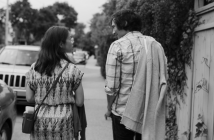
Noah Baumbach, the critically acclaimed director of The Squid and the Whale, Margot at the Wedding, Greenberg, and Frances Ha, not to mention co-screenwriting credits on Wes Anderson’s The Life Aquatic with Steve Zissou and DreamWorks Animation’s Madagascar 3: Europe’s Most Wanted, sat down with Next Projection’s Mel Valentin to discuss his latest film, While We’re Young, a New York City-set, Woody Alleneseque comedy-drama centered on a forty-something, married couple (Ben Stiller, Naomi Watts), their not-so-chance meeting with a younger hipster couple (Adam Driver, Amanda Seyfried), and the revelatory experiences, both positive and negative, that follow.
We discussed everything from Baumbach’s latest, unreleased collaboration with Greta Gerwig, Mistress America, millennials vs. Gen-X, ex-Beastie Boys’ Adam Horovitz’s dramatic turn, thanking DreamWorks Animation in the credits, writing for Ben Stiller, and more.

Ben Stiller and Naomi Watts in While We’re Young
Did you always plan to make While We’re Young and Mistress America back-to-back?
Yeah. It goes back even further. The initial plan was to make While We’re Young first, but it didn’t happen for various reasons. Then we made Frances Ha, and Ben was [off]making Walter Mitty, which was a much longer commitment. Greta [Gerwig] and I were working on Mistress America and had this other movie we wanted to do, and we felt like, we’re not going to have enough time to finish it, but why don’t we just do it as far as we can do it. I knew we had enough time to shoot it and start cutting it, but I wasn’t going to be able to [finish it.]I actually cut it fairly well, but I wasn’t finished, so I made While We’re Young and then went back and finished Mistress America.
In going back through your filmography, I couldn’t help but notice that the theme of generational conflict appears frequently.
I wasn’t really that conscious of the notion of being young or old as much as I was characters that were interesting to me and stories that I was interested in telling. I was thinking about couples from different generations and how they interact, but I wasn’t thinking of it in terms of my other work. That doesn’t mean it’s not there.
Adam Horovitz of the Beastie Boys appears in While We’re Young and gives a surprisingly warm, genuine performance. Do you think he might want to continue acting?
Yeah, I think so. I hope he’ll do it for me again. I love working with Adam. There was no question in my mind that he was going to be great. You could just tell.
You thank DreamWorks Animation in the end credits. How did that come about?
I worked on Madagascar 3: Europe’s Most Wanted. They’ve been great partners in a way, and I really like working with them. I felt like I wanted to acknowledge their support for me even though they weren’t involved in this movie.

Bill Stiller in While We’re Young
Were you thinking of Ben Stiller as your lead while you were writing the script?
I don’t always write with someone in mind, but I started writing this after Greenberg came out, and we had a really great time on that. There was a connection and we became friends. I did this one with him in mind, and it was clear to me early on that I wanted to write a comedy of a type, something that connected me to movies from my adolescence, when studios would make comedies for adults that could be mainstream and have broad humor, but could also be character oriented. I felt like using Ben’s comic iconography in my terrain.
Richard Linklater has been asked whether he allows his actors to improvise when they appear in his films and he said, “No. Nothing.” It’s impressive, because the dialogue sounds so natural, as if it had to be improvised, and yet it’s not at all. From what I understand you work the same way, with your actors not improvising at all on set.
To quote Richard Linklater, “No.”
Does writing dialogue come naturally to you?
Dialogue for me is something that comes quickly. That doesn’t mean the scenes come quickly. Often I kind of write my way and have conversations [in my head]to find the characters and the scenes early on. In a way, I’m improvising with myself. I can write dialogue for quite some time, but it’s like, where in it is the scene? Sometimes you’re lopping off the top and bottom and it’s in the middle, and other times it’s like, I found it over here, and now I can start the scene. It really depends. In some ways, that’s the motor for me.

Ben Stiller and Adam Driver in While We’re Young
Your portrayal of hipsters and hipster culture (Brooklyn edition) is surprisingly balanced. They’re relatively likable and not too unpleasant.
Part of [that]is that we meet the [hipster couple]through Naomi and Ben. We’re kind of learning them through the eyes of another couple. Because Ben’s character is stuck in many ways and looking for answers, he puts so much of it on Adam Driver’s character. I felt like, from Adam Driver’s character’s perspective, no human being should have to bear the responsibility of saving somebody else’s life. As it turns out, he doesn’t hold up under that weight, nor should he. Some people have looked at it the other way. “You’re saying the hipsters are destroying [everything.]” But I don’t see it that way at all. There are also arguments about technology and truth in art, which are subsets of the major story that I’m telling, which is of a marriage. Sometimes you have to come apart to come back together, which is a traditional comedy structure. Shakespearean even. In that I could then wrestle with all these arguments about things in the moment and generational fights without needing to take sides. I wouldn’t know what side to take anyway.
Charles Grodin has a reputation for being selective and thus not working frequently. How did he get involved in While You’re Young?
One of my casting directors, Doug Aibel, was at a benefit or something and saw Grodin there. [Grodin] intimated that he was open to working, and we happened to be casting. We were thinking about this character, and Doug told me [about Grodin]immediately, and I said, “Let’s make this happen.” I met with him, had a long meeting, and he did it.
A minor detail I noticed was that Adam Driver’s character sometimes ends sentences with “see.”
In crafting the way he talked, I felt like that was a sort of old-timey way of saying things. It might be something he kind of took to. It’s kind of like a Damon Runyan thing, like he’d be into old New York. The way he says “beautiful” is like in the ’60s when people would say, “It’s just beautiful! It’s just beautiful!” It’s like a compilation of old stuff.
You’ve mentioned in the past that you’ve been trying to get The Squid and the Whale into the Criterion Collection. Has there been any progress on that?
Yes. It’s more like dealing with a rights thing right now, but yeah. Everybody wants it to happen.
While You’re Young’s soundtrack is really eclectic. Why did you pick Vivaldi?
Vivaldi supplied a timeless aspect to the movie, which balanced it out because it is so eclectic. I felt like the overarching score would almost take you into another era entirely, or all eras, really. Vivaldi for me also brings back older movies that I liked. Kramer vs. Kramer is one that used Vivaldi very well, obviously to different effect. I thought it was working really well for the movie, but it also was bringing me back in touch with movies from my childhood that had real meaning for me. I saw this movie as my version of those films. I love the energy, and there’s something very New York-y about it.
I read in an interview that you loved Naomi Watts in Mulholland Dr. and that you thought her performance was very funny.
I saw humor in it. That audition [scene]she does…you can’t do that if you don’t know what’s funny. It’s funny because it’s not funny. I’d wanted to work with Naomi for a while, and there were times when I thought of her, but I didn’t have a part for her. She’s just somebody I’ve had on a wish list of actors I’ve wanted to work with. This just seemed like an ideal thing for her. Again, thinking of Kramer vs. Kramer, I thought Ben and her together almost evoked Dustin Hoffman and Meryl Streep. We even sort of dressed them similarly. I was thinking of that symmetry. She’s just lovely. I always think of the hip-hop [dance class]scene. I felt like Naomi Watts going into that class feels much more intimidating because you feel her anxiety about what’s going to happen. Thus, it’s that much funnier when she actually jumps in and commits. It was like a way to have a comic set piece without announcing, “Here comes the funny dance scene.”




Pingback: stop parking()
Pingback: part p electricians required()
Pingback: locksmith salary in oklahoma()
Pingback: you can try here()
Pingback: alkaline water brands()
Pingback: house blue()
Pingback: Blue Coaster33()
Pingback: check my blog()
Pingback: electrician apps for ipad()
Pingback: payment plan()
Pingback: water ionizer plans()
Pingback: payment plan()